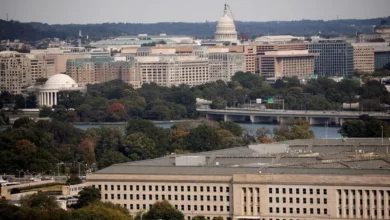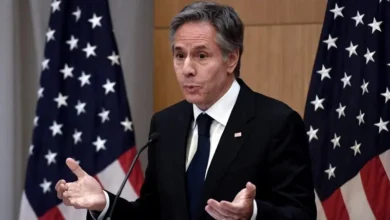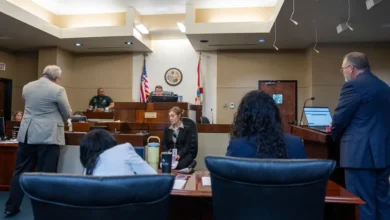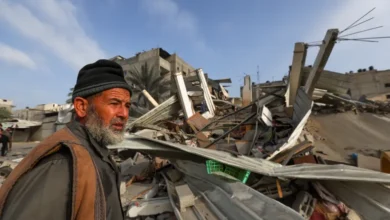Israel’s war on Gaza triggered a war on free speech in the West
Tony Greenstein
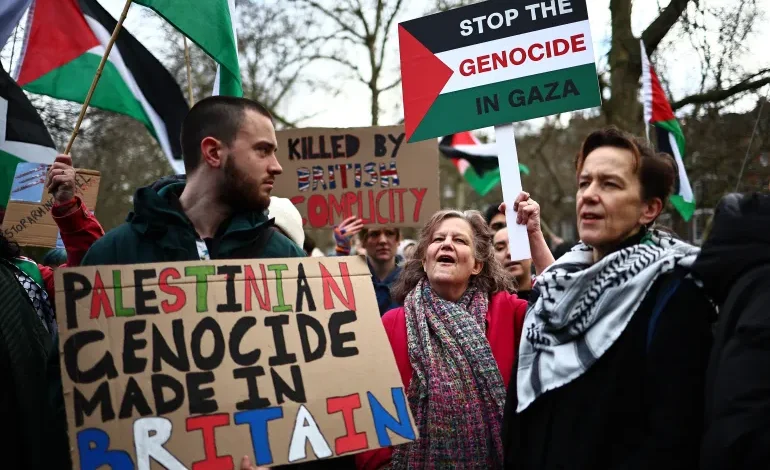
On December 20, I was woken up at 7am by the ringing of my doorbell. At the door were two police officers.
I was told I was being arrested on suspicion of committing an offence under Section 12 (1A) of the Terrorism Act 2000 of the United Kingdom.
The relevant section of the law states: “A person commits an offence if the person – (a) expresses an opinion or belief that is supportive of a proscribed organisation, and (b) in doing so is reckless as to whether a person to whom the expression is directed will be encouraged to support a proscribed organisation.”
The officers explained to me that my alleged offence was related to a single tweet I posted about Hamas on November 15.
Having only just gone to bed and being somewhat sleepy, the only response I could initially manage was to tell them that my arrest was “Orwellian” and that we are clearly now living in a dystopia. I was struggling to accept that in the 21st-century UK, I was being arrested, not for something I had done, but for expressing an opinion.
I had written the tweet in question in response to a Zionist, who was baiting people online to say they “support Hamas”, which has long been proscribed as a terrorist organisation in Britain, and thereby get arrested.
Identifying himself only as James, this person told me:
“Just tweet
I support Hamas!’
3 words is all you have to tweet and then we know where you stand.”
I refused to take the bait and responded “I support the Palestinians that is enough” before going on to say “and I support Hamas against the Israeli army”.
Looking back, I believe this was, especially for a social media platform like X, a carefully calibrated and accurate expression of my genuine opinion.
That day I did not say “I support Hamas politically” for the simple reason that such a statement would not be true.
As a Jewish atheist, socialist and secularist, I naturally do not support Hamas or any other Islamist or religious group. That does not mean, however, that I do not respect and admire the resistance Hamas has been conducting against Israel’s genocidal army.
I criticised Hamas often in the past. For example, in February 2011, in an article published on my personal blog titled “The lousy Hamas government”, I criticised the group for its initial refusal to support the Egyptian people’s uprising against Hosni Mubarak. Over the years, I’ve also written articles and blogposts criticising the group for its use of torture, its support for the two-state solution, its repression of women and attacks on secular Palestinian youths demanding their freedom. My blogpost titled “We Support the Palestinian people of Gaza not Hamas” was published nearly 15 years ago, in 2009. I’ve also written extensively about how Hamas was a creation of the Israeli state – an important fact the West chooses to forget today.
Despite all this, I explained to my police interrogator, I do indeed support Hamas’s resistance against Israel’s military. This is because when it comes to resisting Israel’s murderous war on Palestinians in Gaza, I would support the devil himself – just as in the second world war I would have supported the Polish Home Army’s resistance to the Nazis, despite their anti-Semitism.
Unfortunately, my experience of being arrested merely for expressing a pro-Palestinian opinion online is not in any way unique. In the past few months, British police have doubled down on their longstanding efforts to stifle free speech on Palestine by equating all expressions of support for the Palestinians with support for Hamas. Mick Napier, the founder of the Scottish Palestine Solidarity Campaign, was arrested a few days before me, for a similar “offence”.
This is because, since the beginning of Israel’s latest war on Gaza, and the public protests against it, there has been unprecedented political pressure on the police to keep an eye on, and when necessary silence and sanction, pro-Palestinian voices.
These renewed efforts to criminalise pro-Palestinian activism and speech have not in any way been subtle.
The BBC, the voice of the British establishment, for example, casually stated in a news report in October that widespread pro-Palestinian demonstrations in the country were in fact “pro-Hamas” (the corporation had to retract this assessment after a public backlash), and Home Secretary Suella Braverman, defined them as “hate marches” attended by “sick” anti-Semites.
Prime Minister Rishi Sunak made his own feelings clear when, during a visit to a Jewish school in London, he announced that the government had handed the police “all the tools, powers and guidance” needed to police these pro-Palestinian protests, adding “anti-Semitism will not stand”.
Eventually, Braverman took things a step too far and accused London’s Metropolitan Police of favouring pro-Palestine protesters, forcing Sunak to sack her.
All this was an extension of the British political and media establishment’s longstanding efforts to portray anti-Zionism and support for the Palestinians as anti-Semitic, to protect Israel and to further Britain’s imperial foreign policy agenda.
To that end, the misnamed “Campaign Against Antisemitism” even suggested that repeated pro-Palestinian demonstrations in London had forced British Jews to “vacate their homes” and “remove their Star of David necklaces and hide their kippahs”. This, despite the Jewish bloc on the last few demonstrations in London consistently being over 1,000 strong.
I myself attended many such demonstrations over the past few months and witnessed firsthand the warm welcome extended to Jewish people in these spaces. In one protest, there was even a group of Muslim women chanting “Judaism yes, Zionism no”.
Today, the British government, with full support from the Labour opposition under Keir Starmer and much of the mainstream British media, is attempting to use smears of anti-Semitism to legitimise its relentless attacks on the most fundamental democratic freedoms of Britons. All Jews support Israel, their argument goes, thus any criticism of “the Jewish state”, including the criticism of its genocidal war on Gaza, is inherently anti-Semitic. Of course it is not pro-Palestinian demonstrators but this argument, which implies all Jews are supportive of Israeli policies of starving Palestinian civilians, bombing hospitals, and slaughtering children merely because they are Jewish, that is truly anti-Semitic.
Meanwhile, many Jews who are vocally critical of Israel and its war on Gaza are either ignored and erased by the media and the political classes or, as in my case, subjected to bogus prosecutions and persecution. The same is true in Germany where anti-Zionist Jews are subjected to state repression because they don’t play along with the narrative that Israel is the embodiment of what it means to be Jewish.
What made my arrest over a tweet in support of Palestinian resistance possible in the first place was Hamas’s status as a proscribed terrorist organisation.
The British state designated the military arm of Hamas as a terror organisation in 2001 and extended this proscription to include the group’s political wing as well in 2021.
In its policy paper on the matter, the UK government justified this decision by stating Hamas “used indiscriminate rocket or mortar attacks, and raids against Israeli targets”. “During the May 2021 conflict, over 4,000 rockets were fired indiscriminately into Israel,” it added, “civilians, including 2 Israeli children, were killed as a result.”
These reasons, of course, are ludicrous and serve only to expose the British state’s hypocrisy. If firing unguided rockets towards an occupying army in possession of state-of-the-art defence systems, and killing a handful of civilians in the process, is enough for Hamas to be branded as a “terrorist” organisation, then Israel, which has dropped tonnes of explosives on a besieged population and murdered some 24,000 people, including more than 10,000 children, in a matter of three months is undoubtedly a terrorist organisation as well and should be proscribed as a terrorist organisation. Yet, those supporting Israel and its attacks on the Palestinians unconditionally are not finding police officers on their doorstep.
The British state is trying to criminalise any support for and solidarity with the Palestinians, and attacking our right to freedom of speech as enshrined in the Human Rights Act 1998 and Article 10 of the European Convention of Human Rights, merely to ensure Israel can continue with its blatant violations of international law.
In the past three months, the Israeli military has bombed refugee camps, hospitals and schools. It killed more than 100 journalists, many in targeted attacks alongside their extended families, and shot at worshippers shielding in a church. Its total siege of Gaza, coupled with its relentless bombardment of civilian infrastructure, has led to the collapse of the health system and given rise to famine conditions.
I will learn on March 20 whether the police are going to charge me with an offence. Whatever happens, however, I will not be deterred from speaking out against Israel’s atrocities and in support of the Palestinian struggle for liberation and dignity. As Palestinians in Gaza face a genocidal war, their supporters in Britain and elsewhere in the West are facing an assault on their right to free speech. But we will not give up our fight – for a free Palestine and a truly democratic Britain.
